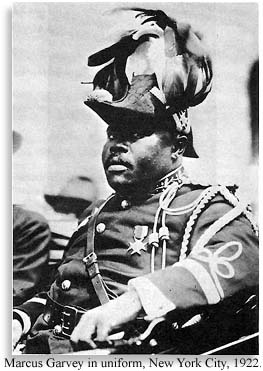

Reflections on Black History
By Thomas C. Fleming
San Francisco History
Index
History by Subject
History by Year
Biographies
The Museum's Homepage
REFLECTIONS ON BLACK HISTORY
Column 5: Marcus Garvey Comes To Harlem
By Thomas C. Fleming
Marcus Garvey, the leader of the Back to Africa movement, arrived in Harlem in 1916, the same year I did. He was 38, an immigrant from Jamaica, and in a short time he became one of the most famous black men in America.
I was 8 years old and living on 133rd Street in Harlem, right in the middle of where the Garvey movement started.
In my neighborhood, there were probably more West Indian than American-
These people used to say they were subjects of the king, and would tell you that
back there, they could get jobs that blacks weren't getting here. But they were
the lowest-
Garvey never became an American citizen, although he lived in New York for nine
years. He started the Universal Negro Improvement Association, which at one time
might have had over a million members. But in New York, I think the only ones
who considered him to be a leader were the West Indians.
I heard a lot about him, and then I started seeing him. They used to have
parades along 7th Avenue frequently. Garvey would always be standing up in a big
open-
I didn't understand what it meant then. But I think it was all part of trying to
attract more members. The dues weren't very much. A lot of black women joined
that thing. And just about every woman I met when I was growing up worked as a
domestic. They got very, very low wages.
The first thing Garvey did was take all those dollars and form a steamship
company, the Black Star Line. The first ship, an aged tub, was leaky and
unseaworthy, and barely made it out of New York harbor. He sold people on the
idea: this is the ship that's going to take you back to Africa and carry on
commerce between Africa and here. He later added two more ships, but not one of
them ever landed in Africa.
His idea was to set up a colony of American blacks in Liberia. The Liberians
first went along with this, but then changed their minds and wouldn't let him
in, because they were afraid he would take over political power.
The U.S. government wanted to break up the movement because it saw any movement
of black people as a threat. The Department of Justice in Washington thought he
was trying to start a rebellion, so they accused him of bilking poor working
people, and arrested him on several fraud charges for collecting the money to
buy the steamers and to start other commercial businesses. He was tried in
federal court and jailed in Atlanta, then later deported to Jamaica.
Two of Garvey's biggest enemies were W.E.B. Du Bois, editor of the NAACP's
magazine The Crisis, and Philip Randolph, editor of The Messenger, a socialist
weekly paper, and founder of the Brotherhood of Sleeping Car Porters. They
thought the Back to Africa movement was a harebrained idea &$150; just like I think.
The idea didn't occur among any blacks here because Du Bois and all of them saw
how utterly ridiculous it was. Garvey was taking advantage of people with low
education and low-
Garvey had a dream, but I don't think the Back to Africa movement was ever
possible. How was he going to get enough money to move all the blacks back to
Africa? And nobody wanted to go over to Africa.
But Garvey still has a lot of supporters today. There are Garvey societies
throughout the United States and in other countries, and the biggest park in
Harlem has been renamed Marcus Garvey Park.
 There was some antagonism between the American-
There was some antagonism between the American-
©1997 by Thomas C. Fleming. Born in 1907, Fleming is a writer for
the Sun-
Return to the top of the page.
